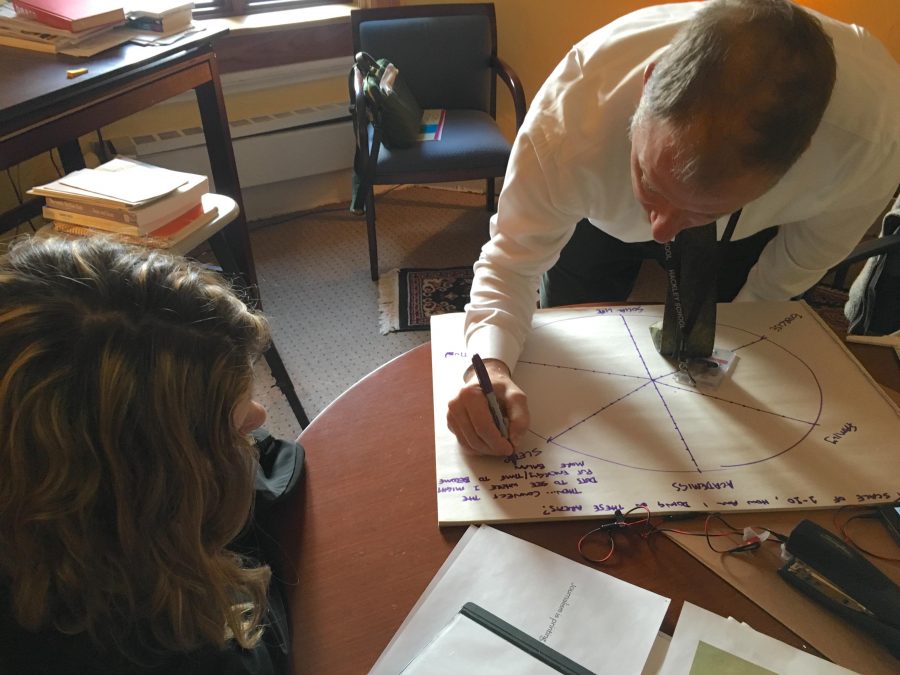Q&A with Charles Colten, Director of Community Wellbeing
Credit: Christian Riegler
Mr. Colten draws a visual representation of different ways to sustain balance in our lives.
February 10, 2017
Q: In your experience, are Hackley students able to balance social and academic activities while maintaining a healthy mindset?
A: What is most important is not whether or not I think that students are able to balance their social and academic activities, but rather what each of you (students) think for yourself. I would encourage everyone to check for yourself, and to do this on a regular basis. “How am I doing?” “ How well balanced is my life?” “Am I attending to the things that I value and consider most important?” Once we reflect on these questions, we can then decide if and what we’d like to do to either maintain or restore the balance in our lives.
Q: How does your department try to aid students in keeping balance in their everyday lives?
A: The Health and Wellness initiatives at Hackley are cross-divisional and cross-departmental, spanning everything from the Lower School, Middle School, Upper School, Faculty, Staff, and Parents. Rather than a departmental initiative, it is a community-wide commitment to being our best selves as individuals and as a community. In terms of aiding students in keeping balance in our everyday lives, there are two primary ways. One is through the health curriculum in the Lower School, Middle School, and Upper School. Each of these has been expanded and deepened since Hackley made the commitment to wellness as a core value in 21st century education. The health curriculum includes character values, meditation, stress reduction, resilience training, and physical wellness. The other way consists of mindfulness practices and resilience training that are integrated directly into classrooms, advisory, athletics, and the arts. Many teachers have already started to incorporate these activities into their classes and have reported that they’ve seen very positive results. What is even more important is that students have reported how valuable these practices have been, and students are asking their teachers if they can “do” the centering exercises, breathing practices, or just take a moment of stillness and silence at the beginning of class to reflect or gather their thoughts. Many students and other community members have come to me, either individually or in groups, to learn ways to reduce stress, to improve their sleep, or to have better nutritional health. As the Director of Community Wellbeing, I am available on a drop-in basis, or by appointment, to consult on behalf of the students, faculty, staff, and parents.
Q: Do you have any other tips for students taking midterms to maintain wellness?
A: A certain amount of stress can be beneficial. The nervousness of taking a midterm, preparing to go on stage, compete in a debate tournament, or play in a big game gets our system jumpstarted. Cortisol and adrenaline flow through your system and pumps you up to perform. However, too much stress and/or chronic stress can frazzle or block the neural pathways that allow you to remember what you studied or even see, hear, and feel what is happening right now. Preparing yourself to be in the optimal state of alertness and relaxation is fortunately something over which you have some control.
Taking midterms or not, these tips will help you perform at your best: academically, athletically, artistically, and interpersonally. Eat, Sleep, Breathe.
- Eat. Putting good “fuel in the tank” will help you attain your peak performance. Put lousy “fuel in the tank” will limit your performance. Included in this is drinking enough water. Proper hydration leads to optimal performance, mentally and physically. When someone is malnourished or dehydrated, they are not at their peak, can be irritable or impulsive, and they often make simple mistakes that they otherwise would not. Fortunately, we are in a position where this is an easy one to address.
- Sleep. Figure out how much sleep you need to be at your best, and adjust your bedtime accordingly. This will be different for each person, so again, “check for yourself.” Getting adequate sleep is one of the simplest things one can do to ensure that you will get good grades, do well in sports, arts, and interpersonal relationships.
- Breathe. Sometimes when we get stressed out, we either forget to breathe, or our breathing becomes shallow. Taking the time to stop and breathe deeply can literally open the neural pathways in the brain, allowing you to accurately assess what is going on, to remember what you’ve studied, and to make good judgements about how to respond.

